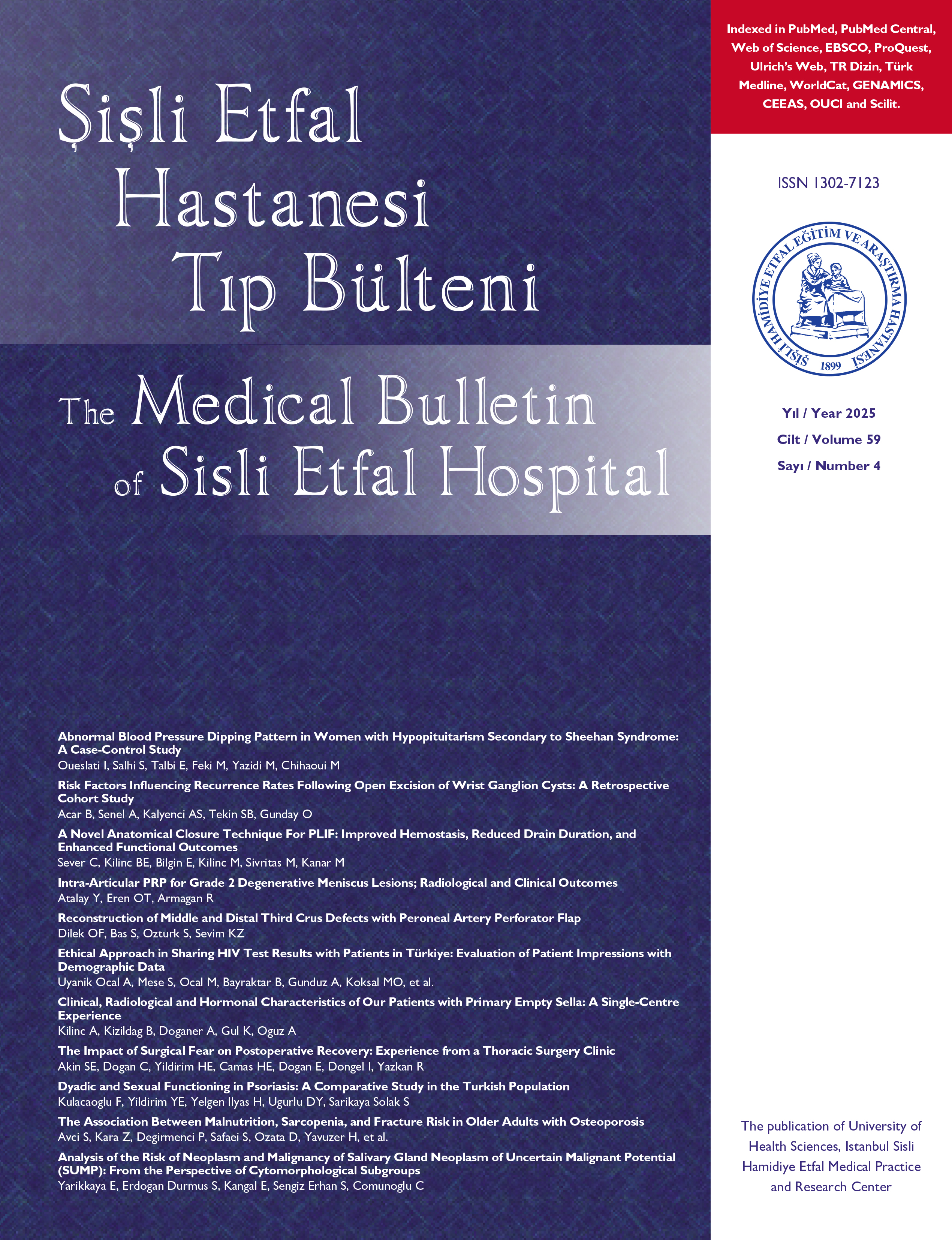
Important side effect of zoledronic acid treatment in metastatic breast cancer: renal failure
Kezban Nur Pilancı1, Gül Alço2, Çetin Ordu3, Rümeysa Çiftçi4, Zeynep Erdoğan İyigün5, Filiz Çelebi6, Ülkühan İner Köksal3, Dauren Sarsenov7, Serkan İlgün8, Filiz Ağaçayak6, Vahit Özmen91Haseki Eğitim ve Araştırma Hastanesi, Tıbbi Onkoloji Kliniği, İstanbul - Türkiye2Florence Nightingale Hastanesi, Radyasyon Onkolojisi Kliniği, İstanbul - Türkiye
3İstanbul Bilim Üniversitesi, Tıbbi Onkoloji Kliniği, İstanbul - Türkiye
4Bakırköy Dr. Sadi Konuk Eğitim ve Araştırma Hastanesi, Tıbbi Onkoloji Kliniği, İstanbul - Türkiye
5İstanbul Bilim Üniversitesi, Fizik Tedavi ve Rehabilitasyon, İstanbul - Türkiye
6Florence Nightingale Hastanesi, Radyoloji Kliniği, İstanbul - Türkiye
7Florence Nightingale Hastanesi, Genel Cerrahi Kliniği, İstanbul - Türkiye
8Taksim Eğitim ve Araştırma Hastanesi, Genel Cerrahi Kliniği, İstanbul - Türkiye
9İstanbul Tıp Fakültesi, Genel Cerrahi Kliniği, İstanbul - Türkiye
Objective: Renal failure is one of the most prominant adverse effect of the zoledronic acid (ZA) which is well known to decrease the skeletal-related events (SREs) in breast cancer patients developing bone metastasis. In this particular study, our object was to evaluate the incidence of this side effect and the risk factors leading to the development of renal failure.
Material and Method: A total of 97 patients who underwent ZA treatment for breast cancer with bone metastasis in our institute between March 2006 and December 2013 were evaluated. For the assesment of renal failure, serum creatinine levels were obtained before the treatment. Preliminary and the highest levels of creatinine levels during the treatment were used in calculation of creatinine clearance according to the Crockcroft-Gault formula. The age of the patients, the number ZA treatment periods, number of the infusions, the simultaneous anti-cancer treatments, non-steroidal anti-inflammatory drug use, diabetes mellitus and presence of hypertension were recorded.
Results: The mean age of the patients was 54±10 years and the treatment period of ZA was 37±18 months. In all of the patients participated in this study the preliminary creatinine levels were under 1.4 mg/dl. In 22 of our patients (23%) creatinine levels increased more than 0.5 mg/dL, besides creatinine clearance were found out to be decreased both of which were pointing out the renal toxicity. In two patients creatinine clearance was under 30 ml/min. and one of the patients has undergone renal dialysis. The only independent risk factor underlined was the advanced age (60 years ≤) (p=0.017).
Conclusion: As a conclusion breast cancer patients with bone metastasis undergoing ZA treatment are prone to the development of renal failure. In order to avoid this particular risk of developing renal failure, serum creatinine levels should strictly be monitored before the treatment and meticulous attention to the hydration should be given during the treatment especially in patients with advanced age.
Keywords: Metastatic breast cancer, renal failure, zoledronic acid.
Metastatik meme kanserinde zoledronik asit tedavisinin önemli bir yan etkisi: Renal yetmezlik
Kezban Nur Pilancı1, Gül Alço2, Çetin Ordu3, Rümeysa Çiftçi4, Zeynep Erdoğan İyigün5, Filiz Çelebi6, Ülkühan İner Köksal3, Dauren Sarsenov7, Serkan İlgün8, Filiz Ağaçayak6, Vahit Özmen91Haseki Eğitim ve Araştırma Hastanesi, Tıbbi Onkoloji Kliniği, İstanbul - Türkiye2Florence Nightingale Hastanesi, Radyasyon Onkolojisi Kliniği, İstanbul - Türkiye
3İstanbul Bilim Üniversitesi, Tıbbi Onkoloji Kliniği, İstanbul - Türkiye
4Bakırköy Dr. Sadi Konuk Eğitim ve Araştırma Hastanesi, Tıbbi Onkoloji Kliniği, İstanbul - Türkiye
5İstanbul Bilim Üniversitesi, Fizik Tedavi ve Rehabilitasyon, İstanbul - Türkiye
6Florence Nightingale Hastanesi, Radyoloji Kliniği, İstanbul - Türkiye
7Florence Nightingale Hastanesi, Genel Cerrahi Kliniği, İstanbul - Türkiye
8Taksim Eğitim ve Araştırma Hastanesi, Genel Cerrahi Kliniği, İstanbul - Türkiye
9İstanbul Tıp Fakültesi, Genel Cerrahi Kliniği, İstanbul - Türkiye
Amaç: Kemik metastazı gelişen meme kanserli hastalarda kemiğe bağlı olay (SRE) gelişimini azalttığı bilinen zoledronik asitin (ZA) en önemli yan etkilerinden biri renal yetmezlik gelişimidir. Bizim bu çalışmadaki amacımız, bu yan etkinin sıklığını ve gelişimini etkileyen risk faktörlerini değerlendirmektir.
Gereç ve Yöntem: İstanbul Florence Nightingale Çalışma Grubu arşivinde yer alan ve Mart 2006-Aralık 2013 tarihleri arasında ZA tedavisi verilen kemik metastazlı 97 meme kanseri hastası çalışmamıza dahil edilmiştir. Renal yetmezlik değerlendirmesi için, serum kreatinin seviyesi her tedavi öncesi ölçülüp, başlangıç ve en yüksek kreatinin değerleri alınarak, Crockcroft-Gault formülüne göre kreatinin klirensi hesaplanmıştır. Hastaların yaşı, ZA kullanım süresi, ZA infüzyon sayısı, eşzamanlı antikanser tedaviler, nonsteroidal antiinflamatuar ilaç kullanımı, diabetes mellitus ve hipertansiyon varlığı kaydedilmiştir.
Bulgular: Ortalama hasta yaşı 54±10 yıl ve ortalama ZA kullanımı süresi 37±18 ay olarak bulundu. Başlangıç kreatinin değeri tüm hastalarda 1.4 mg/dLnin altında idi. 22 hastamızda (%23) kreatinin değerinde 0.5 mg/dLnin üzerinde artış olup, kreatinin klirensinde düşüş saptanmış ve renal toksisite olarak değerlendirilmiştir. İki hastamızda kreatinin klirensi <30 ml/min. düşmüş ve 1 hastamızda diyaliz ihtiyacı olmuştur. Renal yetmezlik gelişimi için tek bağımsız risk faktörü ileri yaş (60≤) olarak saptanmıştır (p=0.017).
Sonuç: Sonuç olarak, metastatik meme kanserli hastalarda ZA kullanımı sırasında karşılaşılabilecek en önemli sorunlardan biri renal yetmezliktir. Bu riski azaltmanın en önemli yolu her tedavi öncesi serum kreatinin kontrolü ve özellikle ileri yaş hasta grubunda hidrasyona dikkat etmektir.
Anahtar Kelimeler: Metastatik meme kanseri, renal yetmezlik, zoledronik asit.
Manuscript Language: Turkish



















